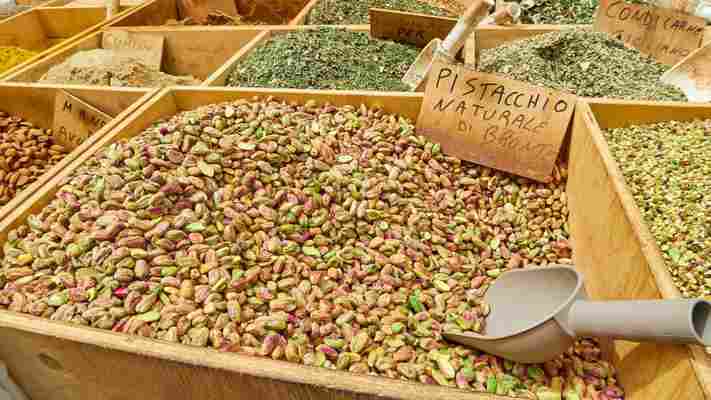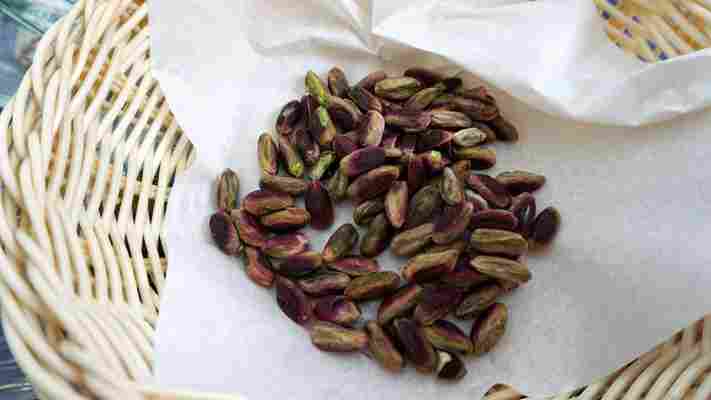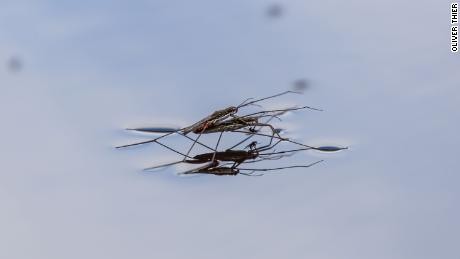The woman defying tradition with pistachios
“You hear that sound?” asked Mariannina Basile, shaking a few nuts. “They should sound like a maraca. That's how you know pistachios are ready to be shelled.” Her intuitive technique tells her just when the purple-skinned, bright-green pistachio (which is technically classified as a drupe rather than a nut) hits its apex of dryness, and thus readiness. It’s a skill she’s developed over nearly 70 years of tending her family’s tiny pistachio farm in Sicily, which has been helmed by three generations of women.

With her gentle green eyes and endearing smile, Basile explained what it was like growing up in the pistachio business that she passed on to her daughter Maria and then granddaughter Samantha Pieraccini, who is currently carrying the torch of their family legacy.

In Italy, pistachios are a culinary specialty used in everything from pestos to pastries (Credit: Coral Sisk)
In Italy, pistachios are a coveted gastronomic specialty, used by chefs and home cooks alike in a variety of culinary applications from savoury pestos for pasta or grilled fish to sweet pastes for cakes and gelato. The most prized and highest calibre pistachios come from the Sicilian town of Bronte, earning them the nickname ‘Sicily’s green gold’. They are so desired and lucrative that they are even subjected to theft and require special protection during harvest time.
You may also be interested in: • A gender fight over an Italian dish • A pasta made only by single ladies • The secret story behind Turkish delight
Pistachio farming in Bronte is unique when compared to other pistachio growing regions like California, where the land is relatively flat and more accessible to machinery and irrigation. Instead, the trees here grow out of rugged volcanic terrain, so machinery can’t pass and all the work must be done manually. However, due to the proximity to Mount Etna, the soil is rich in volcanic minerals, contributing to bolder pistachio aromas and flavours. This is why Bronte pistachios, which account for just 1% of the world’s production, have earned DOP status and can command a higher price than other varieties.
In Bronte, pistachio farming, from fruit picking to tree pruning, is usually left to men. Traditionally, women have been relegated to less physically demanding production tasks such as labelling, bookkeeping and gift packaging. Pieraccini explained that the pistachio industry in Bronte is, and has always been, dominated by men, and old-fashioned gender roles are still common in the industry today – her family being an exception.
Both Basile and her husband inherited some land from their mothers, and they decided to pool their resources and invest in the pistachio business together. She silently worked as a business partner with her husband as the frontman.

The most prized and highest calibre pistachios come from the Sicilian town of Bronte (Credit: EyesWideOpen/Getty Images)
With Basile in charge behind the scenes, the family business didn’t face any major struggles. However, it lost credibility in the eyes of wholesalers once it was passed down to her daughter Maria in 2000 and Basile’s husband stepped down as the figurehead. At that time, the business was structured to sell to wholesalers instead of directly to retailers, and it was commonplace to sell harvest yields in advance. It was Maria’s job to provide yield estimates to buyers, and they would in turn make her a purchase offer.
Although Maria worked tirelessly to keep the business alive, she was constantly doubted by wholesalers during negotiations for her ability to grow pistachios and for her business sense. Because her family’s plot was small, yields were relatively modest. And despite her pistachios being high quality, wholesalers derided Maria’s costs, insisting she had a false sense of confidence for what her product was actually worth.
Often, out of fear of not being able to sell the entire harvest, she would surrender to the paltry offers the wholesalers made. She experienced a pervasive attitude that women weren’t capable of guaranteeing predicted yields or delivering a quality product. Sadly, according to Maria, patronising comments such as, “It’s obvious this isn't an exceptional product, don’t you see?” or “How on Earth do you think you can produce that amount? More like half!” stuck with her for years, impacting her confidence in the pistachio business.
Samantha Pieraccini (left) is the third generation of women to manage her family’s pistachio farm in Bronte (Credit: Coral Sisk)
Despite all the strife Maria dealt with, her daughter willingly agreed in 2013 to carry on her family’s pistachio-growing tradition. While Pieraccini spent summers in Bronte on the farm, she was born and raised in Bologna, which she considers more culturally progressive than her family’s hometown in rural Sicily, and was able to recognise – and later challenge – the conservative gender norms her mother had experienced. Longing to connect to her family’s roots, she decided to move back to Bronte knowing she would face many of the same adversaries.
Taking matters into her own hands, Pieraccini made a radical decision to bypass the wholesalers and sell directly to retailers. At least this way, gains would be higher. However, as a small business, she had to compete on price with larger enterprises that could grow more and offer greater incentives for large purchases.
She started to talk with fellow small-scale producers who held the same vision she and her family did for high-quality production and organic agricultural practices, and helped launch a cooperative , which allowed small producers to pool their yields and sell collectively. The larger quantities increased their competitive edge.
Bronte’s volcanic soil contributes to bolder pistachio aromas and flavours (Credit: Coral Sisk)
But on the farm, Pieraccini still faced difficulties as a woman, such as having to battle to assert herself when directing her farm workers, who were men. She found that they didn’t take her commands seriously, nor did they trust her physical capabilities in the field. “If a woman identifies a plant problem, a man treats her with scepticism,” she said. And despite her efforts to create a progressive working environment, where communication with and motivation of her workers is handled with diplomacy and respect, her workers still adhered to old ways.
“If I ask my workers respectfully to prune in a certain manner and by the end of the day to have a section completed, they'll say ‘Si si , yes don't worry’, and then by the end of the day it’s not done. Whereas if I were a man rigidly making demands like, ‘Hey, this needs to be pruned – just get it done!’, the work would be done in that moment.”
I could leave, but... it would mean to give up and surrender to a dysfunctional system unfavourable to women
Back in Bologna, many friends told Pieraccini to relocate back to the Emilia-Romagna region where the playing field is more equal between genders and financial opportunities are greater. “Why don't you come here where life is easier?” they would ask her. “Apply your expertise here – the money’s better and without the struggle!” But she says she’s too attached to Bronte and her roots, and feels a duty to carry on her family legacy.
She also wants to stay to give agency to her fellow small-scale pistachio producers and, at the same time, help change gender norms in the region. In recent years, she’s helped with petitioning efforts for government funds to improve nearby river systems, as overflow in the winter can create challenges on their farms.
Because of the rugged volcanic terrain, Bronte pistachios must be cared for and harvested by hand (Credit: REDA&CO/Getty Images)
Additionally, the cooperative she helped create has been able to guarantee fair wages to small-scale pistachio producers, and is in the process of developing an e-commerce business as well as opening a storefront, which will sell organically produced pistachios and pistachio-based products directly to locals and visitors. There are many products to consider, too. In the last 15 years, the Bronte region has transformed its prized pistachios into globally renowned, gourmet confections such as spreadable pastes, concentrates and myriad other sweet and savoury novelties, such as flavoured liqueurs and pestos.
In the face of her successes, however, Pieraccini continues to battle for the respect and recognition she believes she deserves. However, to her, it’s worth the fight.
“I could leave, but I don't feel right abandoning the land of my grandparents, to throw away [years] of my life,” she said. “It would mean to give up and surrender to a dysfunctional system unfavourable to women.”
Join more than three million BBC Travel fans by liking us on Facebook , or follow us on Twitter and Instagram .
If you liked this story, sign up for the weekly bbc.com features newsletter called "The Essential List". A handpicked selection of stories from BBC Future, Culture, Capital and Travel, delivered to your inbox every Friday.












Write a Comment